

|
|
Tim Arnold's Pinball Hall of Fame.Tim's 'tennis court', after the 'L' shaped shed was constructed. 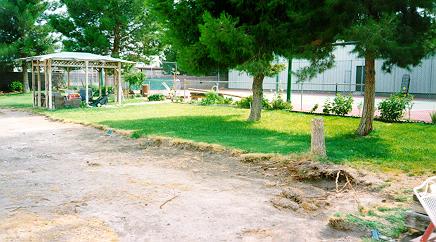
Once in Neveda, over the course of two years, Tim moved his 1000 games from Michigan to Las Vegas. Tim had many games creatively stored in his house and garage. Hundreds of other pinball machines sat on end on Timís tennis court for about six months. This court was never used for tennis, but just a staging area to store and restore the games. Since the Las Vegas humidity is usually about 15% and rain is minimal, outside storage and rust were not a big problem.The back porch where Fun Night first started. 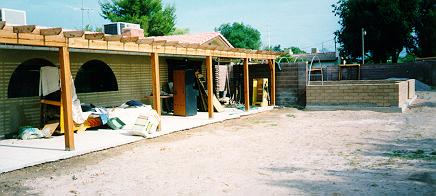
By 1992 all the games were moved into a new 10,000 square foot building Tim built next to the tennis court. The new building, known as "the Shed", was 'L' shaped to wrap around the tennis court. Tim moved all the games to the new building and started working on them, restoring them to like-new condition. From 1992 to 2004, Tim got about 400 of the 1000 games he owns restore and set up for play in the Shed. The rest are stacked like firewood in the back and awaiting restoration.Tim's interesting invitation to 'Fun Night'. 
Around 1993 Tim started have pinball parties which he called "Fun Night". At first these were reward parties for those that helped him with games. Twenty or so games set up on his back porch, and 20 or so friends to play them. But as more games were restored, and electricity added to the Shed, Tim expanded the fun night to more people and twice a year, and moved the fun night from the back porch to the larger Shed. By 1995 Tim would time the fun nights to the Vegas AMOA show (an amusement game industry trade show). As word spread, and as the Shed opened, attendance grew. Tim even purchased the empty property right next to his house so it could be used as parking for Fun Night. At its biggest, Fun Night brought in nearly 1000 visitors for its (expanded) 2-night event.Games for play at 'the Shed' (cardboard protects them from sun fade). 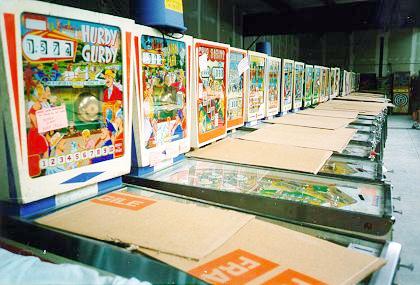
Another goal of "Fun Night" to raise money for local charities (Salvation Army), while also allowing people to enjoy working pinball machines. At the same time Tim started a pinball club called the LVPCC (Las Vegas Pinball Collectors Club). Its mission was to create a "building fund", so some day the public Pinball Hall of Fame could be born. That is, have a building for all the restored games to be stored and set up and played, with the proceeds going to charity.Games stacked in 'the Shed', awaiting restoration. 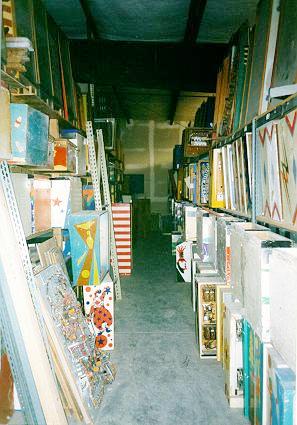
One thing that Tim alway did at Fun Night was to have a raffle and sold "bags of junk." While contributions to the raffle was optional, most people contributed directly to the Salvation Army and/or bought some raffle tickets. Some people even bought 50 or even 100 tickets. Bags of Junk which Tim put together, filled with used pinball parts, where also for sale. Tim has also started making his own pinball video. Though very crude, they were hugely successful and he sold them for $6. Ocassionally a $5,000+ check would appear made to the Salvation Army. The SA would even send their Las Vegas 'Colonel' to the Fun Night to encourage donations to the cause. People would also donate items for the raffle. Stuff like pinball T-shirts, pinball parts, pinball books, PinGame Journal magazine subscriptions, anything a pinball person might buy. The attendees bought many raffle tickets to support the Salvation Army and Tim's high emotions about pinball. But the big support for the whole affair was always from Tim.More games in 'the Shed'. 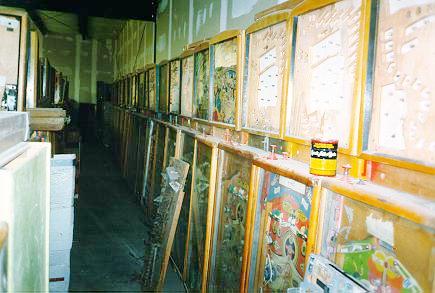
These Fun Nights were planned, organized and funded by Tim and Charlotte. The games were Tim's. Charlotte provided the snacks. Tim paid for the electricity. This all took place in their back yard. It took a lot of work to put on a party which hundreds of friends and strangers show up to play your games for free. It also took some understanding by Tim's wife, dogs, and neighbors. The twice a year "Fun Nights" went on until about 2005 when they got so big that Tim could no longer handle the number of people coming. (The preparation for the next Fun Night always started right after one just ended!)Tim's interesting invitation to 'Fun Night'. 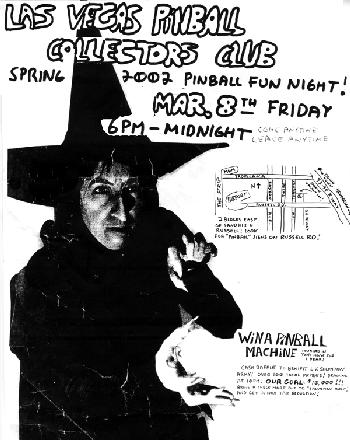
Tim also had some help with the Fun Nights. There was a small band of volunteers, some local, and some who traveled, who spent days in prep before each event. Volunteers like Hopper (Seattle), Hippy, Willey, J.Shelberg (Michigan), Smiley Robert, Ugly Mike, Old Harold (Las Vegas), and others who were willing to help. Help keep people under control. Help shuttle people back and forth to the airport/hotels, help with the games, help with the food, help with everything and anything.Work area in 'the Shed'. 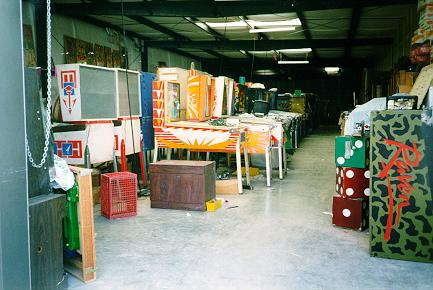
Tim also did other things to help local charities. He would buy old pinball games (or reach into his collection for 'doubles'), spend days restorating the game, and then sell the game. The entire proceeds of the game sale went into the LVPCC building fund account. He also operated his own games as on location around the Las Vegas community. The entire proceeds of this went into the fund. Tim would travel to pinball shows around the country in Chicago and California conducting raffles and selling pinball-related items to raise more money. Also pinball people like Norm and Shaggy and others made pinball videos, donated the masters to Tim, and Tim would sell the videos for money to the LVPCC building fund. All in support of the idea of opening a Pinball Hall of Fame.Tim Arnold (right) 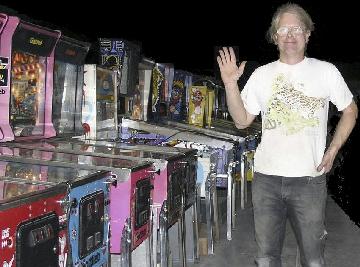
Now Tim's dream of using pinball machines to make money for charity has become a reality. (And heck he now has a place to store 200 more games!) You can share the idea that pinball and charity can go together. Come see what Tim and the Las Vegas Pinball Collectors Club has created at the Pinball Hall of Fame. And course you don't have to just look at the games, you can PLAY them too. Tim and his helper Hippy work everyday at making sure all the games run 100% and are kept clean and attractive. It's a full time job, and one that they are NOT paid to do. As Tim puts it, "it's all about pinball and charity." |